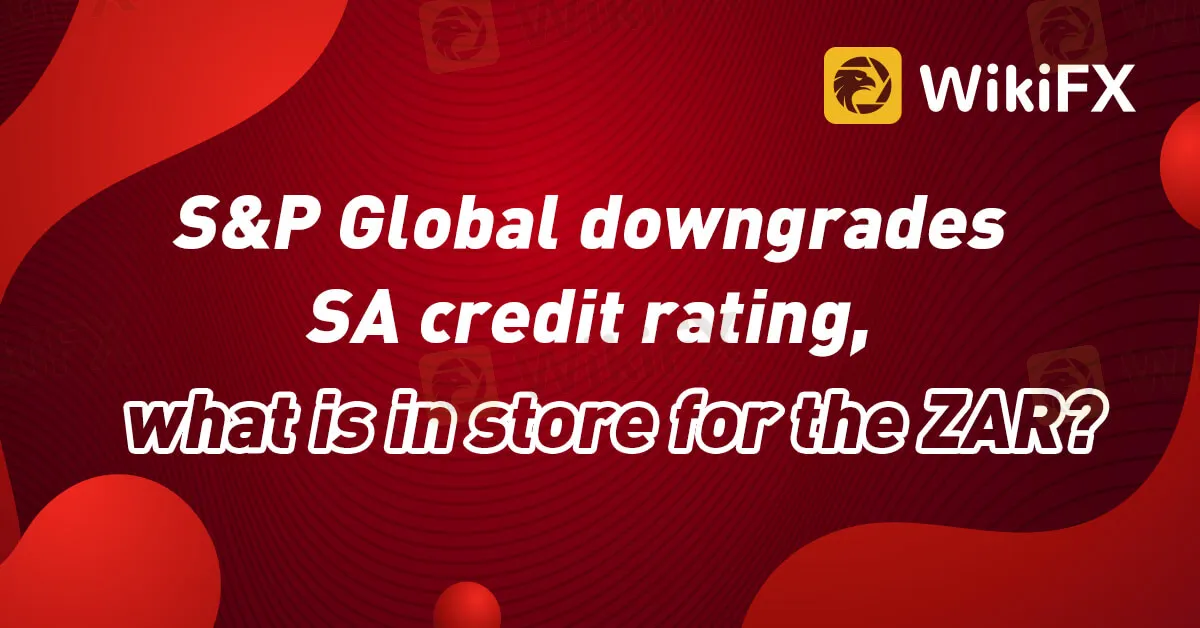简体中文
繁體中文
English
Pусский
日本語
ภาษาไทย
Tiếng Việt
Bahasa Indonesia
Español
हिन्दी
Filippiiniläinen
Français
Deutsch
Português
Türkçe
한국어
العربية
S&P Global downgrades SA credit rating, what is in store for the ZAR?
Abstract:On Wednesday night S&P Global downgraded the credit rating of South Africa due to the current load-shedding crisis that is damaging the economy of South Africa. As we can see today, the ZAR’s value has reached new record lows as the USDZAR has been trading well above the 18.4 level this week.

On Wednesday night S&P Global downgraded the credit rating of South Africa due to the current load-shedding crisis that is damaging the economy of South Africa. As we can see today, the ZARs value has reached new record lows as the USDZAR has been trading well above the 18.4 level this week. Now that there is news of a downgrade of South Africa's credit rating, how should we expect the ZAR to behave over the next few days and weeks?
If you are trying to gain from the immediate fluctuation of the USDZAR you are going to need a South African broker that offers small spreads as opposed to an international broker that will charge premium spreads to access this exotic pair. I recommend you download the WikiFx app today to help you find a South African broker. This app is connected to every broker regulatory board n the world so they can help you find the best regulated and verified brokers. Download WikiFx today and switch up your trading game to the next level.
Why has South Africa's credit rating been downgraded?
The biggest reason why the South African economy is facing uncertainty is because of the issue of electricity supply. The current government-owned electricity supplier (Eskom) has been failing to securely supply electricity for the country as they have been facing historic levels of load-shedding. The South African government has made several promises and efforts to remedy the situation, but the years of neglect of Eskom facilities have resulted in the failing infrastructure that is incapable of keeping up with the electricity supply.
The current solution of running the backup generators is running at the cost of tons of diesel, which is not sustainable as a result there seem to be worsening levels of Load shedding. This does not fare well for the businesses that need an electricity supply to function optimally, hence as the problem persists it gives a negative outlook for the economy of South Africa. This has led S&P Global to downgrade the credit rating of South Africa as investing in South African businesses that are reliant on an unstable electricity supply is sure to affect the profits of investments.
What does this mean for the ZAR?
A lower credit rating means there is less investment interest that will be focused on South Africa. This will mean that there will be potentially less economic activity for South Africa in the next few months until a solution is found concerning Eskom. The ZAR should continue to fall in value over the next couple of months as we monitor the situation with Eskom. This solution is bound to take quite some time to find as we are heading towards winter where there will be a higher demand for energy hence load shedding will likely take longer periods and hence affect the South African economy more, hence why I believe the ZAR is bound to stay on this trajectory

Disclaimer:
The views in this article only represent the author's personal views, and do not constitute investment advice on this platform. This platform does not guarantee the accuracy, completeness and timeliness of the information in the article, and will not be liable for any loss caused by the use of or reliance on the information in the article.
Read more

Germany's Election: Immigration, Economy & Political Tensions Take Centre Stage
Germany is set to hold a crucial general election on 23 February 2025, with voter frustration over migration emerging as a dominant issue.

ED Exposed US Warned Crypto Scam ”Bit Connect”
The Indian Enforcement Directorate (ED) recently exposed a crypto Scam from a firm called Bitconnect. During the investigation, which took place on February 11th and 15th, 2025. The authority recovered bitcoin worth approximately Rs 1,646 crore & Rs 13.50 Lakh in cash, a Lexus car, and digital devices. This investigation was conducted under the provisions of the Prevention of Money Laundering Act (PMLA) of 2002.

XTB Secures Chilean License, Expands Latin America Footprint
XTB gains a securities agent license in Chile, boosting its Latin America presence. The broker plans to offer stocks, ETFs, and derivatives to local investors.

Why Do You Keep Blowing Accounts or Making Losses?
For many traders, consistent losses can feel like an inevitable part of the journey. Some blame the market, others point fingers at brokers, and many convince themselves that luck simply isn’t on their side. But the reality is that repeated trading losses are rarely down to bad luck alone. Instead, a mix of psychological, emotional, and technical factors often leads traders down the path of blown accounts and frustrating setbacks. Understanding these deeper issues is key to breaking the cycle and becoming a more resilient and strategic trader.
WikiFX Broker
Latest News
Germany's Election: Immigration, Economy & Political Tensions Take Centre Stage
WikiFX Review: Is IVY Markets Reliable?
eToro Adds ADX Stocks to Platform for Global Investors
Why Do You Keep Blowing Accounts or Making Losses?
B2BROKER Launches PrimeXM XCore Support for Brokers
Checkout FCA Warning List of 21 FEB 2025
Google Bitcoin Integration: A Game-Changer or Risky Move?
IG 2025 Most Comprehensive Review
It is Not True Love | Tips on Avoiding Romance Scams
XTB Secures Chilean License, Expands Latin America Footprint
Currency Calculator






